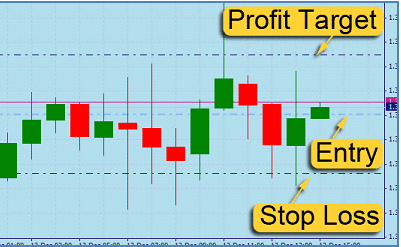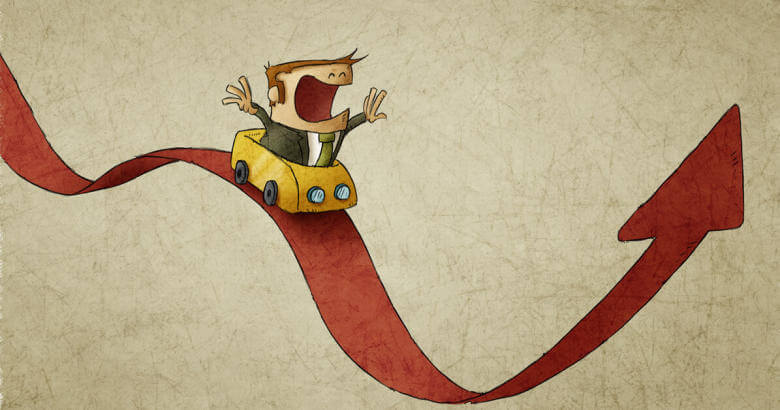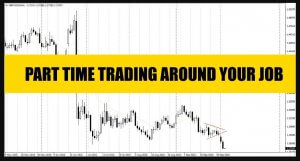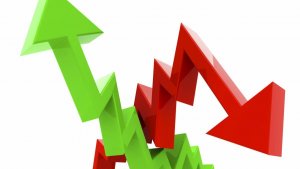The forex market is so unique in its composition that beginners, cross-market traders, and even some more experienced traders often feel perplexed to an extent that they find it difficult to understand what trading currencies is really about. Risk, big banks, discipline, patience, good and bad indicators are just some of the numerous topics that can help you govern your trades more successfully, but there is also a question that many never seem to think of, despite its profound importance. We all focus our interest on the ways in which we could earn a higher profit, hoping to avoid any risk including losses. Understanding losses, however, comprises such a crucial stage in individual trade psychology growth that it truly requires special attention. Therefore, today we are diving deep into the topic of how to handle a losing streak while trading in the forex market, leaving no stone unturned on the path of making you a better trader.
When you think about losses you have experienced in the past trades or the potential of taking losses in the future, how do these images make you feel? Feelings might, understandably, make many grown-ups think of chick flick movies, but to be able to generate a comprehensive idea about the manner in which you are trading, and improve every aspect of your forex career as a result, you should give yourself the opportunity to explore this topic thoroughly. The notion of feelings is so intricately connected to that of trading currencies precisely because our emotions can at times get the best of us, blurring our vision and dulling our senses. Whenever people are losing, they tend to start behaving impulsively by making a series of extremely hazardous moves. The danger behind these reactions to losses is not the emotions traders go through, but real chances for them to ruin practically everything they have struggled to build up until that moment.
Many traders make the same mistake of not recognizing the true nature of this market when approaching forex trades. The forex market is inherently prone to losses, so what we need to do is make ourselves less susceptible to their impact. To achieve this stage of understanding, we primarily need to acknowledge the fact that it is we who give value to any event. Our chance of making the most of any circumstances will vary depending on how we react to different events. This is such a paramount lesson because until we allow for this shift in consciousness to take place, we will not move from the stage of making fatal mistakes due to feeling weak and imbalanced. Trading psychology is the very foundation of trading, without which one cannot expect to go much further.
Losing can easily take its toll on you unless you decide to push against the need to undergo pressure. The moment you reach the professional level, you will see these losses in a different light and the degree of their impact will change. The uneasiness may never disappear completely, but your skill of handling losing streaks will make all the difference in the world. Some forex experts have shared their experiences of how losing affected them in the past and how their own reactions have pushed them much farther from their goals, ultimately endangering the opportunity to trade in the future. The learning curve may be steep in this respect, but the results are astoundingly transparent and tangible.
If at the moment of experiencing a loss traders demonstrate an inability to stop overreacting, they should be aware that this is an indication of a dangerous loop that has only one outcome. The professionals whose stores on social media inspire traders across the world have clearly explained how their accounts have once gone down in no time only because of their rash responses to losses. These events are the moments that uncover all of our fears, hopes, and dreams, and such disclosure can potentially lead to an enormous hole you may never get yourself out of. Many of these prominent figures on forex platforms say that had they known these lessons at the time, they would have reached the professional level considerably faster.

Some people, unfortunately, never manage to recover from the aftermath of their reactions. We naturally assume that the stronger a person is in terms of their mental and emotional capacity, the less likely they are to be triggered by some unexpected events. When traders see how their accounts are growing and how everything is unfolding to their benefit, they immediately start making big decisions and larger moves. Trading in this market can affect your mind quite easily and you need to prepare so that you do not succumb to your impulses. Now that we know that traders tend to exhibit uniform reactions despite some major differences in their trading styles, we must adopt the steps and incorporate the lessons that will limit the volatility of our own minds.
In order to secure your future trades and maintain consistency from the very beginning, you need to ensure that the entire testing process is managed in a precise manner. Aside from sharp thinking, you do not need to invest in meticulous testing methods and procedures, as these are vital steps that will allow you to understand your progress. Due to previous inconsistency and a degree of carelessness, some professional traders nowadays express regret for not having tackled this phase more diligently in the past. The common cause of such remorse lies in the understanding that, instead of allowing the system to carry the weight of the trade, these individuals let their emotions get in the way.
This part of trading is so precious that you must do whatever it takes to eliminate any holes within the testing phase. You can primarily achieve this by aiming to conduct thorough analyses without missing any of the steps. Testing can be a detailed process, but you must perceive it as a chore and feel discouraged to proceed. Instead of feeling demotivated, find comfort in knowing that by measuring everything you can, you will be able to see exactly what you have before you; for example, you can immediately find out whether your trade is going to be a win or a loss. By taking on the viewpoint of understanding how relevant precision and conscientiousness are, you will never feel like a powerless trader whose efforts have not been supported by the results achieved.
In terms of testing stages, we should first differentiate between backtesting and forward testing, which are both indispensable elements that provide invaluable information to the trader. If you do not engage in the backtesting process properly, the forward testing part will never reflect the reality. Since forward testing should be carried out in the same way that you would trade real money, you do not wish your results to be flawed at this point. Therefore, if you do not handle testing properly, you will inevitably suffer the consequences down the road.
Laziness to store information so meticulously will be exposed in the form of losses, probably taking place at some very peculiar points when real money is involved. To prevent this from happening, you may need to put the effort into rehearsing as many times until it becomes a natural part of your routine. That way, when your own money is invested, you feel more inclined to keep trading feeling safe and equipped with sufficient information. If you still decide not to do much at this point, understand that once the real money – whether it belongs to you or a firm that solicits your services – the entire trading will certainly become increasingly serious and complex. Help yourself, or the future version of yourself, do the job properly by putting in the effort now instead of needing to salvage your account despite having been cautioned against being sloppy or reckless.
Many traders become extremely excited when they feel that they are on the verge of a breakthrough that they unintentionally make some of the worst mistakes there are. Many a time have beginners, in particular, experienced such exhilaration that they started analyzing the losses trying to find a reason why they would not have taken the trade anyway. By blaming a faulty indicator’s underperformance on some market activity or a negative news event, you are not forthcoming with yourself and such superficiality will cost you your money sooner or later. Many traders may feel tired from searching for the perfect solution to complete their algorithm, but they repeatedly fail to understand the key meaning of this process. Constant justification of a tool’s malfunction through the assessment of which external factors could have impacted the trade in question clearly reveals that traders act as if nothing has happened, turning a blind eye and choosing falsehood instead of the truth.
 What traders should strive to do, first of all, do exactly the opposite from the example above, record everything, and, despite the excitement that they have felt before, accept the harsh truth because it is what will prove to be the best option in the long run. Should you discover a system that functions extremely well during the backtesting phase, be ready for your forward testing to reveal a different picture. Nonetheless, getting results that are not as great as they were in the previous phase should not deter you from completing the forward testing stage. Traders should not let themselves be charmed by the results that they get before they finalize both stages of the testing process because, despite the bitter taste of sobering up, they should understand knowing and having all the facts at their disposal will prove to be their main weapon in the future.
What traders should strive to do, first of all, do exactly the opposite from the example above, record everything, and, despite the excitement that they have felt before, accept the harsh truth because it is what will prove to be the best option in the long run. Should you discover a system that functions extremely well during the backtesting phase, be ready for your forward testing to reveal a different picture. Nonetheless, getting results that are not as great as they were in the previous phase should not deter you from completing the forward testing stage. Traders should not let themselves be charmed by the results that they get before they finalize both stages of the testing process because, despite the bitter taste of sobering up, they should understand knowing and having all the facts at their disposal will prove to be their main weapon in the future.
The forward testing part is generally believed to last between 6 and 12 months, so if you happen to discover a great system in the first go and you are certain that it is the best system you have found until that point, you can now present these statistics to a potential client or future employer. Hence, any results you gain from the testing process need to be clear and devoid of mistakes as much as possible, especially since you will be trading someone else’s money, should they feel equally impressed with the results you have come up with. Therefore, if your starting point is 50,000 USD and your losses take you down by 3,000 USD, you cannot ignore that something is missing and simply hit the reset button. Even if after starting all over your second take proves to be significantly more prosperous, you will have nothing but fraudulent data to present. Due to the fact that such information does not mirror the reality, you will be exhibiting deceitful behavior before the people to whom these results are presented.
If you are not ready to present some genuine results, you are in fact unprepared to take any losses. However, without accepting the losses, you will hardly know how to get to and maintain your wins. There is little you can do about losses in trading, apart from striving to come up with the best possible system. If you are dissatisfied with the results you get upon the completion of the 6—12- long testing period, you need to accept the fact that whatever you have put together will simply not generate any positive results in the future either. Starting over at this point is a sensible and a necessary activity, although it still might feel slightly discouraging. Nonetheless, bear in mind that if you decided to proceed with such a defective system and enter any trades with (your or other people’s) real money, the unrealistic results you chose to ignore would hunt you down and you would not be able to escape the losses.
Traders deserve nothing less than killer results that they can truly use in the future, but they will never get these unless they put in the effort into recording every step (e.g. currency pairs, indicators, number of wins and losses, and winning percentage) and accept the losses for what they are. Losing streaks are an inevitable and inherent part of trading currencies. If it happened early in the testing process, what you definitely should refrain from doing is to exit the trade and start a new one. Let the trade run for as long as it needs to and allow your system to take care of any current misfortunate events. Stop panicking about the losses and rather allow yourself to adopt a much healthier, realistic point of view.
You need to understand the rules of acting on the long-term strategy because only when you set your priorities straight will you in fact be able to adopt a more objective standpoint. If you keep reacting to losing streaks, which will naturally keep happening more or less unpredictably, you will hardly get the opportunity to reap the rewards. And if you do not get to the part of enjoying your wins, you will lack the one thing that can mend the blow that you previously got from the loss. The losses and the wins are then two polarities that make this game run and by distrusting the system you are proving that you are a weak individual who reacts to a string of losses instead of seeing the bigger picture. If you let yourself be slightly more relaxed and open to these natural oscillations, your next win will compensate for the upcoming loss.
Also, be mindful of the need to be realistic as a 10% return to which you have grown your account after several months cannot lead to you to a 40% return year after year. On a more objective and genuine note, you can actually expect to use up the 10% and return to the point where you first started. After you see your hard work turn to dust, you may naturally feel disappointed and upset. However, gather your strength and allow yourself to think in a more long-term manner. Many of the wins you come by will shield you against the losses, so strive to see the bigger picture. When the time comes for you to invest real money, you will be prepared to accept both the good and the bad together with all the in-between shades.

The forex market entails going through both the highs and the lows, so the way you respond to these opposites will ultimately determine the result you are going to get. In order for you to absorb the losses, you cannot start making changes in the system whenever you feel like the plot is not unfolding the way you wanted. Many experienced traders have confessed how they tried to get away with tweaking the system in the past, so they ended up suffering greatly when real money was involved in the game. Assuming that these changes are going to make your end result better is what responding to the market looks like. Just because you are experiencing losses at this moment should not push you to alter any setting or part of the system in which you invested so much time to test.
If you are looking for advice on how to survive losses then the best action you can take is to refrain from making any move. Do not engage in making any changes and simply stay put until you see that string of losses through. If you gather the courage and be an adult about his part, you will provide yourself with a real chance to successfully move on. The greatest professionals in the forex market are those individuals who know how to take losses regardless of how it makes them feel. They have, in fact, invested in putting their emotions on the side and learned to stop when the time comes. Instead of putting all the action after experiencing losses, you should strive to be less avoidant during the testing phase. Insist on being proactive rather than reactive, as the losses will naturally come and go.
To willingly desist from reacting to a seemingly negative event, you need to practice withstanding the blows. Your nature, that is the nature that you share with all human beings, will probably always tell you to do more and ideas may start surging up in your mind, but you need to realize that being controlled and disciplined at this stage is the only thing that can stop you from completely destroying your account. Taking a step back does not however imply that you can take a break from trading at any point. Should you feel that a certain currency pair is not working out for you at this moment, you cannot press pause on it until a later time. Resisting from making adjustments and tweaking the system does not imply the mentality of picking through the charts as you please.
The mentality which involves either making changes in the system or stepping out of the game before time is increasingly dangerous and downright wrong for this type of business. The theory of natural chaos entails that these periods of order, where the market consolidates or stands, and chaos when the market starts to trend once again, alternate naturally. If you, then step out of the game during the quiet phase, you will inevitably miss out on the big runs because it is where the market is heading. The runs that are always around the corner need to be patiently waited out so that you can cover up the losses that preceded this stage. Unless you let this happen in its natural order, you will in fact let yourself take the losses without reaping the rewards.
If you have not engaged in a similar activity during the testing phase, why would you not let yourself participate in a big win now? Do not erase the losses regardless of how many times they have already occurred because you will not earn those pips that you are meant to have. When trading real money, remember how testing felt like because it might remind you of the feeling of gratification and fulfillment that stemmed from earning those wins. Since you did not give up the moment you encountered a loss before, strive to recall the sense of persistence and urge that led you to the winning stage.
If you encountered a currency pair or market activity that appeared to be acting rather choppily or disorderly, thereby knocking all of your trades, you probably started to panic. The fear coming from seeing such hectic activity and its demoralizing outcomes could have turned you into a completely reckless, short-term player. In your mind, you probably had thought rushing through with anxiety telling you that these misfortunes will never cease and that your account is doomed. So, you thought that some action on your behalf could mend the severity of the situation and get you to a better position. Unfortunately, you soon learned that this was a really bad decision.
The only step that you should make at the time of consolidation or choppy periods is to stay put because your efforts are not logical. The only thing that makes sense at this stage is the understanding that the market will soon start trending again so that your losses will have the chance to be replaced by wins. If you have already worked toward creating a system that evades losses, learn how to trust it. If you constantly get in the way and try to innocently pull a trick on your own system, you are not letting it prevent you from experiencing losses, but quite the contrary.
Do not interpret losing streaks as your own fault because your system is made to block and evade most of them, which it will successfully do if you allow it to. By stepping away from the role of the master controller, keep your system active so that it can do the math instead of you. The only other expectation you will need to have is for your system to take notice of the big runs as successfully as it can escape the choppy and unfavorable parts of the chart. If you find it hard to do so, ask yourself what the purpose of trading and creating a unique system is. If you cannot enjoy the process and if you keep interrupting the natural flow of the market because of some micromanaging tendencies, you should be aware of the impact it is going to have on your overall success.
What you should feel responsible for is giving in to the fear and preventing your system from leading you properly. You cannot expect to design a car which you will then keep inspecting every single moment for gas, changing its parts to see whether another engine works better in the middle of driving. In terms of guilt, despite it being a very bad choice of feeling in general, you should understand that you are the only one to blame for missing out on big runs due to the previously mentioned reasons. Your end result will inevitably reflect the way you address trading and your entire attitude. Unless to choose a disciplined approach, you will need to face some rather gloomy outcomes where those 500-pip runs are not going to appear in your account. You should simply never let these happen as your entire forex trading career is at stake.
The only way to survive a string of losses is to simply gather courage and have faith in your technical and psychological support – your system. As reactive trading never brings any positive or lucrative results in trading, strive to try out these reactions and adjustments in the testing phase. If you are serious about your intention to earn money, rather than lose it, your goals need to be reinforced by controlled activity, not some panic-stricken repossess to what the market is giving you at the time. Although it may go against everything you have been taught so far, you will secure and increase your finances only by simply sitting back and doing nothing apart from allowing your system to do its job.
 Always keep in mind the idea that you are playing the long-term game and this alone should help you distinguish between instant gratification and the ultimate prize. Stop sabotaging your success by getting in the way of your system. Finally, do away with the need to exercise control at the stage when you are not meant to do that. Separate testing from the real game and step up to meet the expectations of the stage you have reached. The requirements imposed on you as a trader will change from one stage to another, but emotions are the one thing you should eradicate as early as possible. If you wish to know the factor which makes all traders lose, you should simply observe the outcome of giving in to all (ir)rational fears and impulsive inclinations.
Always keep in mind the idea that you are playing the long-term game and this alone should help you distinguish between instant gratification and the ultimate prize. Stop sabotaging your success by getting in the way of your system. Finally, do away with the need to exercise control at the stage when you are not meant to do that. Separate testing from the real game and step up to meet the expectations of the stage you have reached. The requirements imposed on you as a trader will change from one stage to another, but emotions are the one thing you should eradicate as early as possible. If you wish to know the factor which makes all traders lose, you should simply observe the outcome of giving in to all (ir)rational fears and impulsive inclinations.
Once the testing part is over, one of your greatest tasks will be to acknowledge its primary function and consistently take the same steps based on which you developed your algorithm and your approach to trading. Even when times are tough, you are to just soldier on and take a leap of faith. The moment you step into the big game, everything must stay absolutely the same. You have a major weapon that you have tested backward and forwards, which further entails that losses must not obstruct you from utilizing its potential.
And, when the day comes for you to present a client or a prop firm with your achievements, you will naturally be aiming at their interest in growing their profit. Nevertheless, you should never let them assign short-term price targets or accept any price-related requests because this should be a clear indication that the individual or company in question does not truly understand the nature of trading. By imposing price targets, the offer you receive will not come from the place of comprehension of the ever-alternating behavior of the market and it will get in the way of your attempts to play the long game. Whatever the surrounding circumstances, you should never allow any external factor, even if that is your client, determine your overall style, dissuading you from applying long-term strategies. Rather let them find another person, whose hyper personality and trading style can easily fit, respond, and adapt to such requirements.
Keep in mind that, once the time comes, your main duty will be to make the people who are investing their money satisfied. The happiness should last as long as possible, so if you surrender to their hunger for making money fast, you will inevitably jeopardize your long-term vision and style. You should speak for yourself and defend your idea of trading. The client you should be looking for is, therefore, a person or a place that can provide you with enough room to do what you do best – trade. Avoid any tendencies in other people that you would naturally avoid in your trading, and do not let anyone tell you which steps you should take. You must, thus, look for a company or a person that knows how to stand aside and let you carry out your trading routine.
Finally, we should reflect on the main lessons this article proposes. Firstly, assume that testing is your most crucial step one as it will help you build a stable foundation upon which you will then be able to keep growing your career. Steer clear of reactive trading and rather rely on the solid system in which you have invested your time and effort. When you are free to start trading professionally, you will want to have completed all testing processes and said goodbyes to emotional responses to the market’s natural highs and lows. Stop assuming that strong people never get trapped and tricked by the emotions game and start working on your trading psychology as soon as possible. Trade your system, not your emotions and, by all means, do not let all the work you have put in so far go to waste.
Now that you know how to test your system properly, how losing impacts traders, and the way in which you should approach these difficult times in trading currencies, you are equipped with some of the most vital pieces of information. The lessons are, as it appears, quite straightforward – if you react to passing losses, you will see lasting consequences and vice versa. Your own unpredictability and lack of control must never hinder your real chance to grow as a trader, so discard all facets of your personality that cannot constructively facilitate your progress and financial gains.






